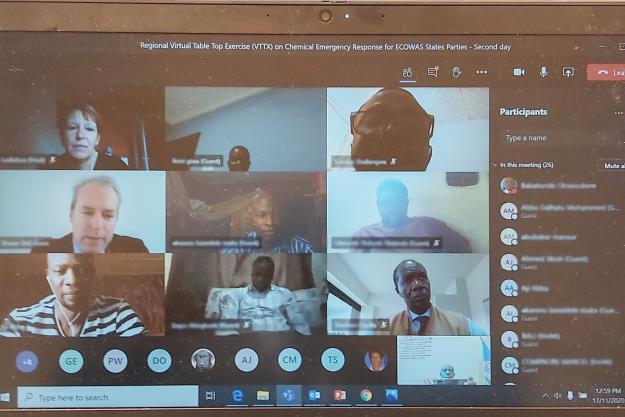
THE HAGUE, Netherlands–18 November 2020–Emergency management planners and first response team leaders from West Africa enhanced their response capabilities against chemical warfare agents during a Regional Virtual Table Top Exercise on Chemical Emergency Response for the Economic Community of West African States (ECOWAS). The training was conducted by the Organisation for the Prohibition of Chemical Weapons (OPCW) and the Higher Institute of Civil Protection Studies (ISEPC), Ouagadougou, Burkina Faso, from 16 to 17 November.
During the opening session, the Head of Burkina Faso’s National Authority for the Chemical Weapons Convention, Dr Issa Touridomon Some, stressed his country’s commitment to supporting OPCW’s efforts to help West African Member States develop technical and operational protection and assistance capabilities. He added: “Achieving those goals will bring us closer to achieving full implementation of the Chemical Weapons Convention.”
OPCW’s Special Advisor on Assistance and Protection, Mr Shawn DeCaluwe, underscored the importance of building chemical incident response capacity and best practice sharing. He stated: “This course will improve the sustainability of OPCW capacity building efforts that aim to strengthen regional response capabilities against chemical attacks and incidents involving toxic industrial chemicals.”
Participants completed a table top exercise that tested the effectiveness of operational and decision making frameworks, communication strategies, and information sharing methods at national, regional and international levels of handling chemical incidents. The participants worked through a crisis scenario using OPCW decisions and policies on responding to chemical weapons use.
The 32 attendees represented the following OPCW Member States: Benin, Burkina Faso, Liberia, Mali, Nigeria, and Togo. An observer from Kenya was also present.
Background
As the implementing body for the Chemical Weapons Convention, the OPCW, with its 193 Member States, oversees the global endeavour to permanently eliminate chemical weapons. Since the Convention’s entry into force in 1997, it is the most successful disarmament treaty eliminating an entire class of weapons of mass destruction.
Over 98% of all declared chemical weapon stockpiles have been destroyed under OPCW verification. For its extensive efforts in eliminating chemical weapons, the OPCW received the 2013 Nobel Peace Prize.
